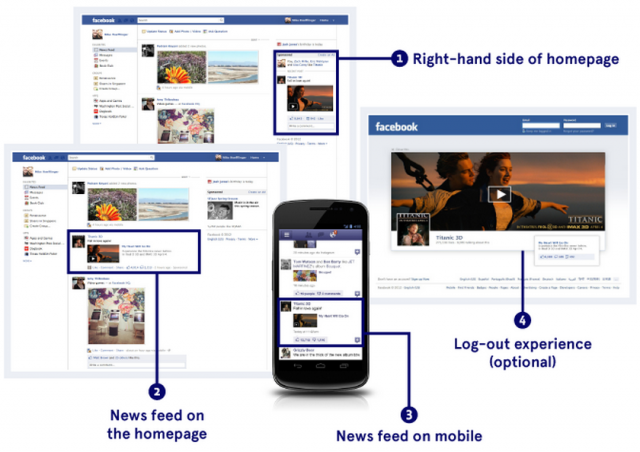Facebook today filed an amended S-1 to IPO that describes new risks based on its launch of ads for mobile, Zynga’s standalone gaming platform, and a patent dispute with Yahoo. It also explained how its concentrated voting structure would impact investors, and listed additional underwriters.
Here are the major revisions to the S-1 compared to the original Facebook filed at the beginning of February. Quotes can be interpreted as strict additions:
Risks
Mobile
- Facebook announced it will now start monetizing mobile using Sponsored Stories ads. It now states its ability to monetize mobile in “unproven” rather than noting it does not advertise on mobile.
Terms Of Service Violations
- Violation of its terms of service, such as creating duplicate accounts, is now listed as a risk that could harm its reputation and business. The Facebook brand could be negatively affected “by the actions of users that are deemed to be hostile or inappropriate to other users, or by users acting under false or inauthentic identities.” Investments to stem these problems may be unsuccessful.
- For example, another prolonged hacking attack like the one in November that spread pornography or gore in the news feed could reduce visits.
Zynga
- Zynga recently launched an off-Facebook gaming platform. If relations with Zynga worsens, it tries to migrate its users to its hosted gaming platform, or it stops investing in its Facebook games, Facebook’s business could be harmed.
- Facebook confirmed it makes a 30% tax on user purchases in Zynga’s games, despite agreements regarding traffic guarantees.
Patents
- Yahoo recently accused Facebook of violating 13 of its patents. Yahoo hasn’t commenced legal action against Facebook but could in the future. Additionally, “we face increasing competition and gain an increasingly high profile, including in connection with our initial public offering, we expect the number of patent and other intellectual property claims against us to grow.”
Inaccurate User Count Measurement
- Inherent challenges in measuring its user base could hurt Facebook’s reputation and business. If advertisers or developers believe its user counts are inaccurate they may be less willing to allocate budgets and resources to Facebook.
- For example “There may be individuals who have multiple Facebook accounts in violation of our terms of service, despite our efforts to detect and suppress such behavior. We estimate that false or duplicate accounts may have represented approximately 5-6% of our MAUs as of December 31, 2011.” This estimate is based on a sample that may not be representative and so it could be inaccurate.
- Mobile metrics may be inflated due to devices that automatically ping Facebook’s server without a user taking action. “We estimate that less than 5% of our estimated worldwide DAUs as of December 31, 2011 and 2010 resulted from this type of automatic mobile activity, and that this type of activity had a substantially smaller effect on our estimate of worldwide MAUs and mobile MAUs.”
Voting Structure
- Facebook now lists itself as a “controlled company” whose board of directors does not have an independent nominating function.
- It notes that through voting agreements with major stockholders, Mark Zuckerberg has a large percentage of voting power. As a result:
- “Mr. Zuckerberg has the ability to control the outcome of matters submitted to our stockholders for approval, including the election of directors and any merger, consolidation, or sale of all or substantially all of our assets. This concentrated control could delay, defer, or prevent a change of control, merger, consolidation, or sale of all or substantially all of our assets that our other stockholders support, or conversely this concentrated control could result in the consummation of such a transaction that our other stockholders do not support. This concentrated control could also discourage a potential investor from acquiring our Class A common stock due to the limited voting power of such stock relative to the Class B common stock and might harm the market price of our Class A common stock.”
- The dual class structure of Facebook’s common stock and the voting agreements among certain stockholders concentrate voting control with Zuckerberg and other directors, which could limit or preclude stochkholders from influencing corporate matters.
- CEO Mark Zuckerberg and COO Sheryl Sandberg work for Facebook at-will with no specific time commitments.
Finances
- Last month, Facebook terminated its prior credit facility, raising its facility from $2.5 billion to $5 billion, and moving from a 0.15% commitment fee to a 0.10% commitment fee per annum on its daily undrawn balance.
- Facebook entered into a bridge credit facility allowing it to borrow up to $3 billion “to fund tax withholding and remittance obligations related to the settlement of RSUs in connection with our initial public offering.”
- When the post-IPO lock-up period ends, substantial sales of stock could cause the stock price to decline.
- Major additional underwriters now include Citigroup, Credit Suisse, Deutsche Bank Securities, RBC Capital Markets, and Wells Fargo Securities.
- Further added underwriters include Blaylock Robert Van LLC, BMO Capital Markets Corp., C.L. King & Associates, Inc., Cabrera Capital Markets, LLC, CastleOak Securities, L.P., Cowen and Company, LLC., Lazard Capital Markets LLC, Lebenthal & Co., LLC, Loop Capital Markets LLC, M.R. Beal & Company, Macquarie Capital (USA) Inc., Muriel Siebert & Co., Inc., Oppenheimer & Co. Inc., Pacific Crest Securities LLC, Piper Jaffray & Co., Raymond James & Associates, Inc., Samuel A. Ramirez & Company, Inc., Stifel, Nicolaus & Company, Incorporated, The Williams Capital Group, L.P., William Blair & Company, L.L.C.
User Growth Stats
- Brazil and Germany are now estimated to have penetration rates of 30-40%, not 20-30% as previously listed.
- The U.S. user base grew to 161 million by the end of 2011, up 16% from the end of 2010.
- “DAUs as a percentage of MAUs increased from 54% in December 2010 to 57% in December 2011, which we believe was driven entirely by increased mobile usage of Facebook. We believe that increases in DAUs and in DAUs as a percentage of MAUs generally positively affect our revenue”
- “Worldwide mobile MAUs increased by 76% from 245 million as of December 31, 2010 to 432 million as of December 31, 2011” not 425 million MAUs as previously listed.
- “We estimate that approximately 58 million mobile MAUs accessed Facebook solely through mobile apps or our mobile website during the month ended December 31, 2011, and the remaining 374 million mobile MAUs accessed Facebook from both personal computers and mobile devices during that month.” That’s a very small percentage of users who are only accessing via mobile where Facebook’s monetization potential is unproven — a bright point in the revised S-1
Sales Growth
- “As of December 31, 2011, over half of our revenue was generated by users in the United States and Canada. However, we are experiencing rapid revenue growth in markets such as Brazil and India due to growth in the number of users and their engagement and an increase in our sales efforts in those markets.”
- Facebook believes new advertising initiatives, including mobile ads, will increase the return on investment for advertisers and thereby increase advertising demand and spend.
- Marketers now have access to real-time Insights on their performance. This could increase spend on Sponsored Stories ads because advertisers will immediately know if a Page post is getting a positive enough reception to make it worth paying to turn into a Sponsored Story.

